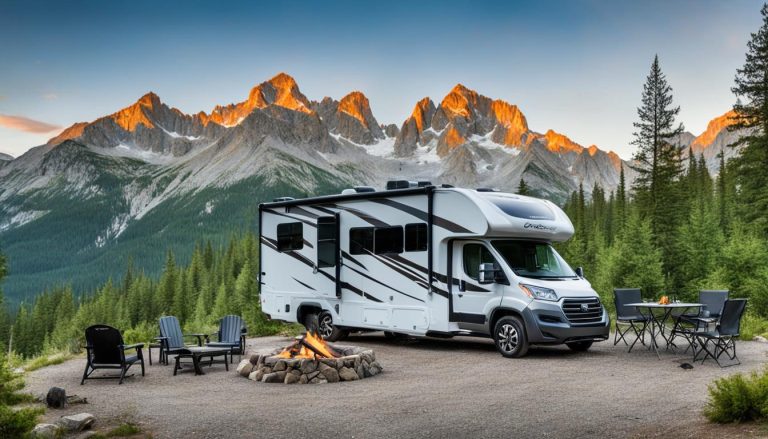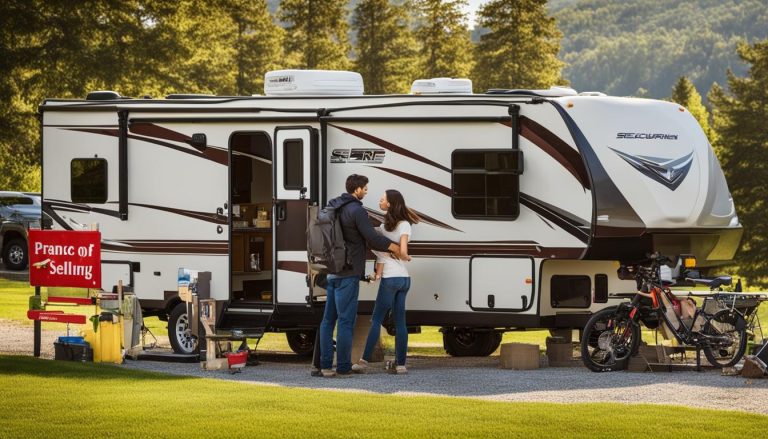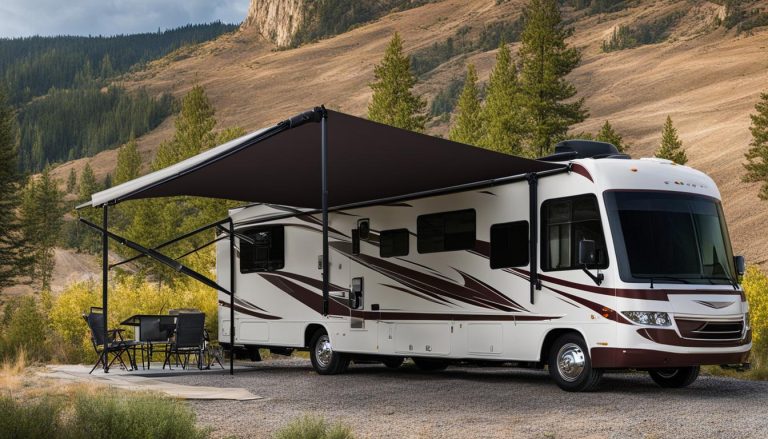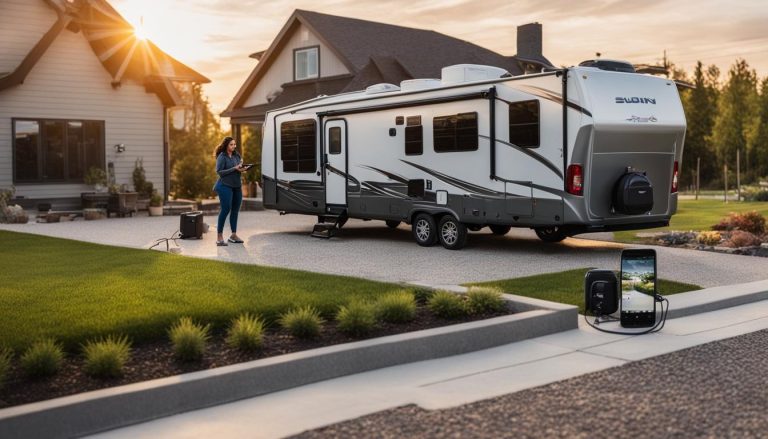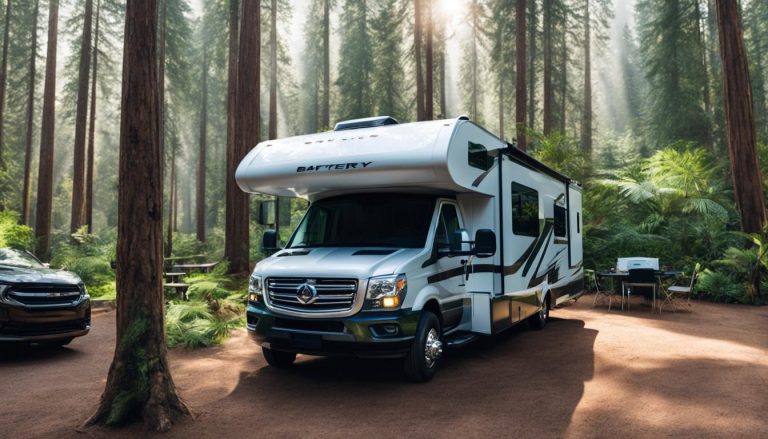Keep Mice Out of Your RV During Winter Storage
gorvlifestyle.com and its partners may earn a commission if you purchase a product through one of our links
When winter arrives, it’s essential to prepare your RV for storage. However, it’s not uncommon for mice to seek shelter inside your RV during this time. To prevent these unwanted guests from wreaking havoc on your vehicle, it’s important to take steps to keep mice out of your RV during winter storage.
To effectively prevent mice from entering your RV during winter storage, follow these helpful tips:
Key Takeaways:
- Inspect the underside of your RV for gaps and holes, and fill them with silicone or expanding foam.
- Check drawers and cabinets for any holes and seal them to limit mouse entry points.
- Remove all food from your RV before storage to eliminate any potential attractions for mice.
- Clean your RV thoroughly to remove any food residue or crumbs that may entice rodents.
- If possible, park your RV on a solid surface like pavement or concrete to make it harder for mice to access.
By following these proactive measures, you can significantly reduce the risk of mice infestations during winter storage and ensure that your RV remains mouse-free when it’s time to hit the road again.
Limiting Access to Your RV
When it comes to keeping mice out of your RV during winter storage, one of the most effective strategies is to limit their access. By sealing any potential entry points, you can significantly reduce the chances of these pesky rodents finding their way inside.
Inspect the underside of your RV for any gaps or holes and seal them using silicone or expanding foam. These materials are excellent for creating a barrier that mice cannot penetrate.
Also, check drawers and cabinets, especially where plumbing and wiring enter, for holes. Seal these areas using the same silicone or expanding foam to prevent mice from squeezing through even the tiniest gaps.
By proactively sealing gaps in your RV, you are taking a crucial step in mouse-proofing your vehicle and protecting it during the winter storage period.
Credit: seowriting.ai
Removing Food and Cleaning Thoroughly
To prevent mice from being attracted to your RV during winter storage, it’s crucial to remove all food from the vehicle. This includes not only perishable items but also non-perishable food that could still attract rodents. By eliminating any potential food sources, you significantly reduce the chances of mice infestation in your RV.
In addition to removing food, it’s equally important to clean your RV thoroughly before storage. Mice are attracted to food residue and crumbs, so by eliminating any remnants, you make your RV less inviting to these unwanted guests. Pay close attention to hard-to-reach areas such as cabinets, drawers, and appliances to ensure thorough cleanliness.
By following these steps to remove food from your RV and clean it before storage, you create an environment that is less appealing to mice and decreases the likelihood of infestation.
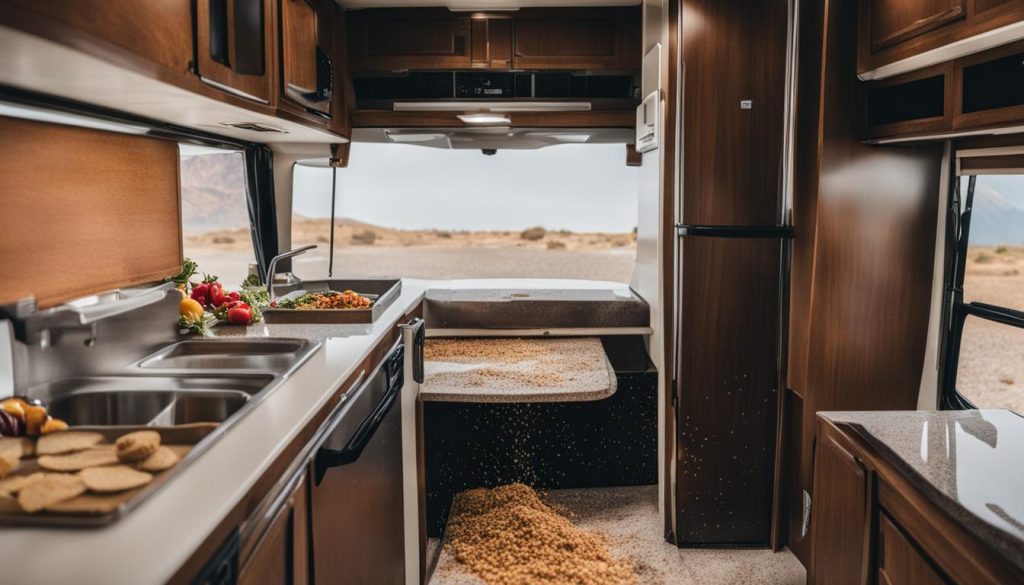
Cleaning Checklist for RV Storage
| Area | Cleaning Tasks |
|---|---|
| Kitchen |
|
| Bathroom |
|
| Living Area |
|
By following this comprehensive cleaning checklist, you ensure that your RV is free from any potential food sources and make it less appealing to mice and other pests during winter storage.
Park on a Solid Surface
If you want to keep mice out of your RV during winter storage, consider parking it on a solid surface like pavement or concrete. This simple step can make it more difficult for mice to access your RV, as they are less likely to burrow through solid ground.
When you park your RV on a solid surface, you create an additional barrier against rodent entry. Unlike areas with loose soil or grass, solid surfaces provide a solid foundation that mice would need to overcome before reaching your RV.
In addition to offering a physical deterrent, parking on a solid surface has other advantages for winter storage. It helps prevent your RV from sinking into the ground and ensures better stability for long-term storage. By choosing a stable and solid parking spot, you can have peace of mind that your RV is securely stored.
Remember, mice are opportunistic creatures and can find their way into the tiniest openings. While parking on a solid surface reduces the likelihood of rodent intrusion, it’s still important to take additional preventive measures to keep your RV mouse-free during winter storage.
Tips:
- Find a paved parking area or a concrete pad for your RV storage.
- Avoid parking on grass or other surfaces that mice can easily burrow through.
- If a solid surface is not available, consider using gravel or crushed rock as an alternative.
By parking your RV on a solid surface, you create an extra layer of defense against mice and ensure a secure storage environment for your vehicle.
Engine Deterrents
If your RV is motorized, starting the engine once a week can help deter mice from making the engine compartment their home during winter storage. The noise and vibration from the engine can make the area less appealing to rodents. By regularly running your motorized RV’s engine, you create an environment that is less inviting for mice to nest.
| Engine Deterrents | Effectiveness |
|---|---|
| Regularly starting the engine | Highly effective |
“Starting the RV engine once a week can be an effective deterrent against mice during winter storage. The noise and vibrations created by the engine make the engine compartment an uninviting place for rodents to seek shelter.”
By implementing this simple practice, you not only discourage mice from infiltrating your RV’s engine, but you also help maintain the overall functionality of the motorized system. It’s a win-win situation that ensures a rodent-free environment and a well-functioning RV engine.
Expert Tip
According to RV expert Mark Polk from RV Education 101, starting the engine regularly can significantly reduce the risk of mice nesting in the engine compartment during winter storage. RV Education 101 offers valuable insights and advice on all aspects of RV ownership and maintenance. Take advantage of this expert tip to keep your motorized RV safe from unwanted rodent guests.
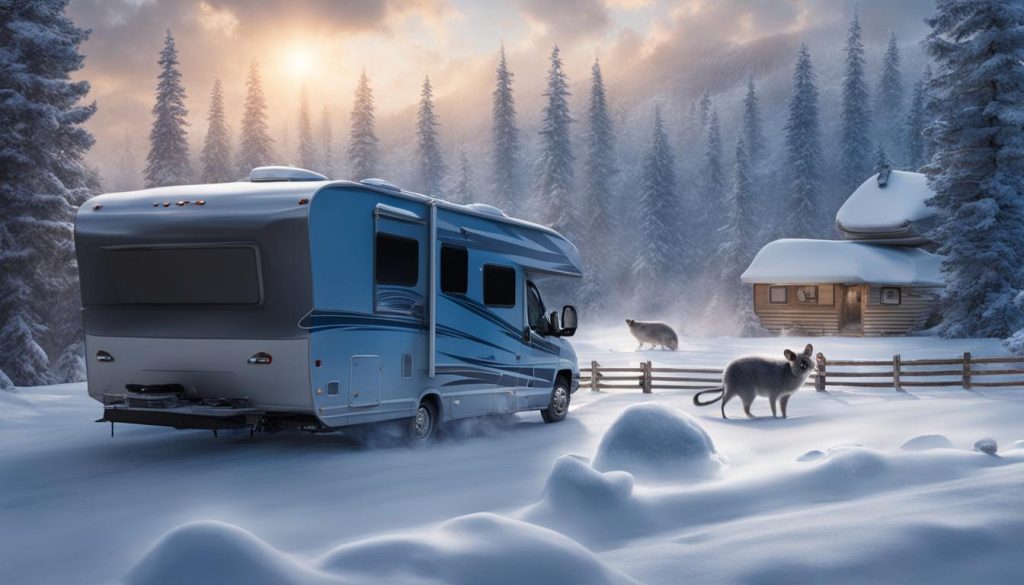
Deterrent Options
When it comes to keeping mice out of your RV during winter storage, there are several effective deterrent options that you can try. By strategically placing these items in areas where mice may enter, such as storage compartments or engine bays, you can help prevent these unwanted guests from making your RV their winter home.
Mothballs
Mothballs have long been used as a mouse deterrent due to their strong odor. The pungent smell of mothballs is known to repel mice, keeping them at bay. Simply place mothballs in key areas around your RV to help deter these rodents from entering.
Dryer Sheets
Believe it or not, dryer sheets can also be effective in preventing mice from entering your RV. The strong scent of dryer sheets, such as Bounce, acts as a deterrent. Place dryer sheets in areas where mice are likely to enter, and replace them regularly to maintain their effectiveness.
Essential Oils
Essential oils, such as peppermint oil or tea tree oil, have been known to repel mice. These oils have a strong fragrance that mice find unpleasant. You can create a natural mouse deterrent by diluting a few drops of essential oil with water and spraying it around potential entry points in your RV.
Conventional Mousetraps
In addition to using deterrents, it’s important to have a plan in case mice do manage to find their way into your RV. Conventional mousetraps can be an effective solution for catching mice and preventing them from causing further damage. Place traps in areas where mice are likely to travel, such as along walls or near food sources.
By incorporating deterrent options like mothballs, dryer sheets, essential oils, and conventional mousetraps into your winter storage routine, you can significantly decrease the chances of mice taking up residence in your RV.
Expert Recommendations
When it comes to keeping mice out of your RV during winter storage, RV expert Mark Polk from RV Education 101 offers some invaluable tips. By following these expert recommendations, you can protect your RV from unwanted rodent guests and ensure a stress-free storage period.
Firstly, limiting access is key. Seal any gaps or holes in the underside of your RV using silicone or expanding foam. Be sure to check drawers, cabinets, and areas where plumbing and wiring enter for any potential entry points and seal them as well. By closing off these access routes, you significantly reduce the chances of mice finding their way into your RV.
Secondly, remove all food from your RV before storing it for the winter. This includes both perishable items and non-perishable food that could attract mice. Give your RV a thorough cleaning to eliminate any food residue or crumbs that may entice rodents. By eliminating food sources, you make your RV a less appealing target for mice.
RV Education 101 also recommends parking your RV on a solid surface if possible. Choosing a solid parking spot such as concrete or pavement makes it more difficult for mice to burrow and access your RV. This additional barrier provides extra protection against rodent entry.
If your RV has a motor, it’s advised to start the engine once a week during storage. The noise and vibration from the engine can deter mice from making the engine compartment their home. By regularly running your RV’s engine, you create an environment that is less inviting for mice to nest.
Finally, RV Education 101 suggests using deterrents like mothballs, dryer sheets, essential oils, or conventional mousetraps. These items can be strategically placed in areas where mice may enter your RV, such as storage compartments or engine bays, to help keep them at bay.
With these expert tips from RV Education 101, you can confidently take the necessary measures to keep mice out of your RV during winter storage. By following these recommendations, you’ll have peace of mind knowing that your RV will be safe and rodent-free when it’s time to hit the road again.
FAQ
How can I keep mice out of my RV during winter storage?
To keep mice out of your RV during winter storage, inspect the underside of your RV for any gaps or holes and seal them with silicone or expanding foam. Check drawers and cabinets for holes and seal them as well. Remove all food from the RV and clean it thoroughly before storage. Park your RV on a solid surface if possible and start the engine once a week to deter rodents. You can also try using deterrents like mothballs, dryer sheets, essential oils, or conventional mousetraps.
How do I limit access to my RV during winter storage?
To limit access to your RV, inspect the underside of your RV for any gaps or holes and seal them using silicone or expanding foam. Check drawers and cabinets, especially where plumbing and wiring enter, for holes and seal them as well. By blocking potential entry points, you can greatly reduce the chances of mice getting into your RV during winter storage.
How can I remove food from my RV and clean it thoroughly?
To remove food from your RV, make sure to remove all perishable items as well as non-perishable food that could still attract rodents. Clean your RV thoroughly before storage to remove any food residue or crumbs that may be enticing to mice. By eliminating food sources, you make your RV less appealing to pests.
Is it necessary to park my RV on a solid surface during winter storage?
If possible, it is recommended to park your RV on a solid surface like pavement or concrete during winter storage. This makes it more difficult for mice to access your RV since they are less likely to burrow through solid ground. By choosing a solid parking spot, you create an additional barrier against rodent entry.
How can starting the engine deter mice from my RV during winter storage?
If your RV is motorized, starting the engine once a week can help deter mice from making the engine compartment their home during winter storage. The noise and vibration from the engine can make the area less appealing to rodents. By regularly running your motorized RV’s engine, you create an environment that is less inviting for mice to nest.
What are some deterrent options to keep mice out of my RV during winter storage?
There are several deterrent options that you can try. Mothballs, dryer sheets (such as Bounce), and essential oils have been known to repel mice. You can strategically place these items in areas where mice may enter, such as storage compartments or engine bays. Additionally, traditional mousetraps can be effective in catching any mice that manage to get inside your RV.
Are there any recommendations from RV experts on keeping mice out of an RV during winter storage?
According to RV expert Mark Polk from RV Education 101, some of the best practices for keeping mice out of your RV during winter storage include limiting access by sealing gaps and holes, removing all food from the RV, cleaning the RV thoroughly, parking on a solid surface, starting the engine regularly if it’s motorized, and using deterrents like mothballs, dryer sheets, essential oils, or conventional mousetraps. RV Education 101 has helped educate millions of RV owners on how to properly use and maintain their vehicles, making their advice a reliable source for keeping mice at bay during winter storage.

